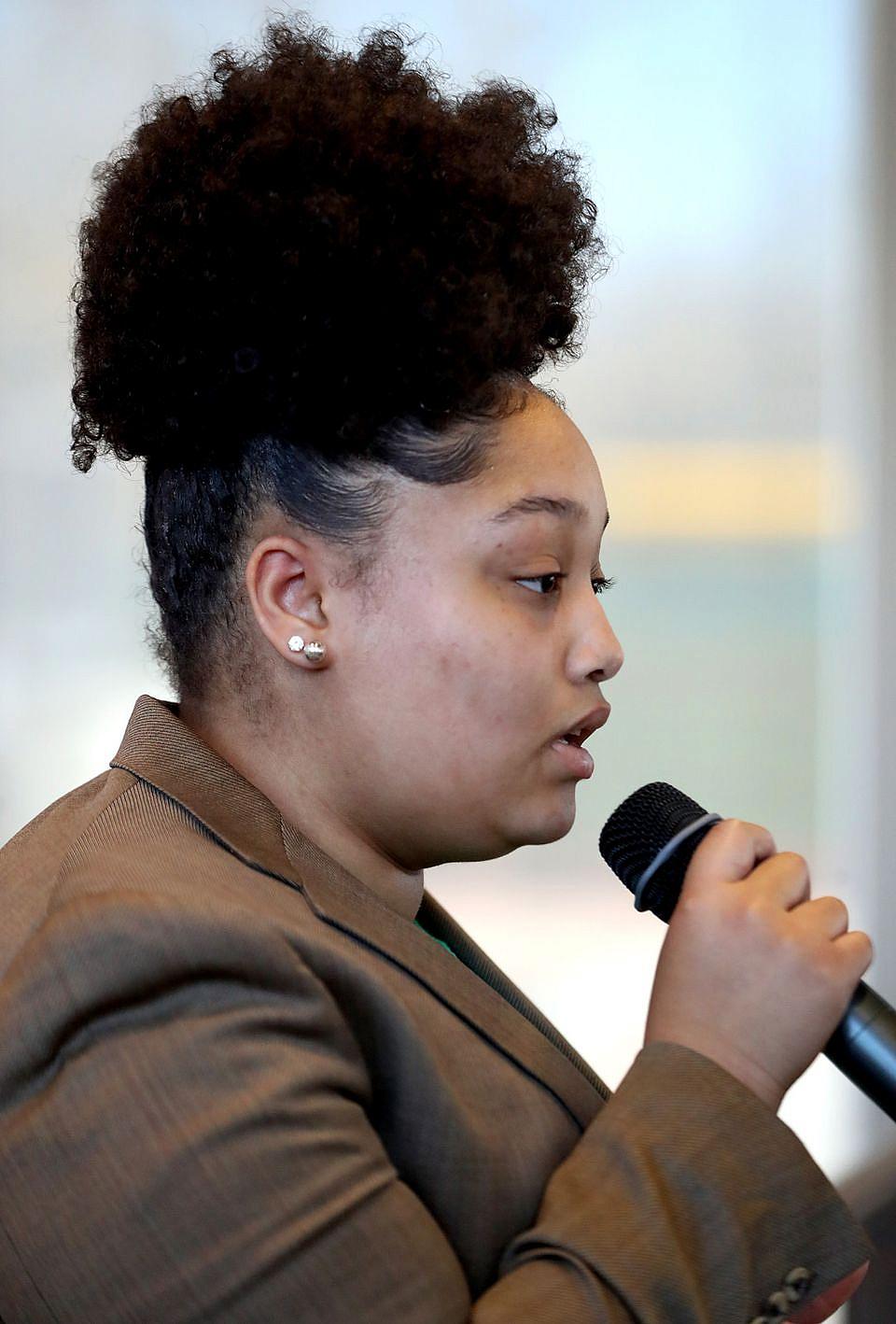Dear Cleveland: Help us improve police relations and our "life skills"
This reporting is supported by the University of Southern California Center for Health Journalism National Fellowship.
Other stories in the series include:
Dear Cleveland: To learn, you first have to listen
Dear Cleveland: Seeking young voices on life in the city and how to make it better

Corrin Cooper, 16, speaks to various leaders in the community at League Park in Cleveland, OH, Monday, April 30, 2018. Cooper is one of the members of the Empowering Youth, Exploring Justice Impact 25 Youth Council. (Marvin Fong / The Plain Dealer)
CLEVELAND, Ohio - Empowering Youth, Exploring Justice Impact 25 Youth Council members shared personal stories to underscore the importance of the projects they proposed to police, community and non-profit leaders Monday.
The council members' pitch programs to strengthen police relations and bolstering education in a host of "life skill" areas to increase independence of young people.
"We started out with a list of 40 topics," council member Sophia Higginbottom, 22, told the group of about 100 gathered at historic League Park, including Cleveland Police Chief Calvin Williams, who sat in the front row. "We had to narrow that down."
The council members spent about an hour discussing the six-month process that lead them to the recommendations they made. Much of what they hoped to change was drawn from their own life experiences, which some council members shared with the crowd.
A 22-year-old council member talked about how he struggled to be confident and make friends after experiencing extreme physical abuse as a child.
Mallory Wilks, 18, of Slavic Village, explained that a lack of sex education left her confused about consent and targeted by some men. Stress from situations like that, and others, have lead many of her peers to feel ashamed and consider taking their own lives, she said.
"My friends tell me that stress is the biggest problem in their lives and has led them to think of suicide," Wilks said. "They feel like if they can manage their stress better, they'd be a lot happier."
A 16-year-old council member told the crowd after she gathered the courage to reveal that a family member raped her, it took three trips to a police station before a report was finally taken by officers, who were rude and disrespectful.
"It honestly hurt me because I felt like I didn't mean anything to anyone," she said. Then, she said, after a month, nobody had followed up with her.
"I felt like I was nothing," she said.
Stress responses in young people are often misunderstood by the community and police officers, council member Martin Thomas said. They also have high community and financial costs.
"I was really impressed with the kids," said Justin Herdman, U.S. Attorney for the Northern District of Ohio, who attended. "The way they related their own life stories was courageous and they presented it in a compelling manner."
Herdman said he walked away from the presentation believing that type of input from young people needed to happen more often. "I'm supportive of their efforts," he said.
During the presentation, council members asked for partnerships and money, about $140,000, to test their plans in three Cleveland high schools and then to measure whether they were effective.
The council specifically asked for help in continuing its work for at least a year, hopefully three, so it could fine-tune its plans and pilot the ideas in three high schools: East Technical High School, Lincoln West High School and Martin Luther King Jr. High School.
In addition, the council proposed:
- To hire one council member to oversee creating a life skills discussion series and work with community policing to plan relationship building efforts.
- To create a weekly discussion series in 9th and 10th grade classrooms with speakers who can help students build life skills that will assist them with the transition to becoming independent adults. Topics they felt students needed the most help with included money management, job readiness, stress management, transportation education, conflict resolution and sexual violence awareness education, and police interaction.
- To have quarterly lunch discussions in the 9th grade with police officers and for teens to have mandatory participation in police trainings to better understand officers' jobs and perspectives.
The recommendation to work on police and youth relationships came despite mixed feelings among council members about some officers and how they interact in Cleveland communities they serve.
Many council members had stories about how they or their friends felt targeted or treated unfairly by police, who searched their book bags or talked down to them. Other council members had family members who are police officers or plan a career as police officers.
Even with those conflicted feelings, the council members decided there was value in working to bring police and teens together more often in informal settings to have discussions and share perspectives.
"We as youth, we don't focus on crime statistics or arrest statistics," Dan Lynch, a council member from Ohio City and a City Year member said. "We focus on how police treat us."
Lynch works in a Cleveland school, and said that one of his students was recently shot and was fighting for his life.
"I didn't know how to handle it," he said, and leaned on his friends as a support system. Imagine what that looks like for a 10 or 11-year-old, he said to the crowd, which also included Cleveland Police district commanders, non-profits representatives from United Way of Greater Cleveland, Third Federal Foundation, and Partnership for a Safer Cleveland, which along with the Cleveland Indians Larry Doby Youth Fund supported the project.
"We want relationships with all you," Chante Arrington, who attends Martin Luther King Jr. High School, told the officers in the group. "And we want them to be positive."

